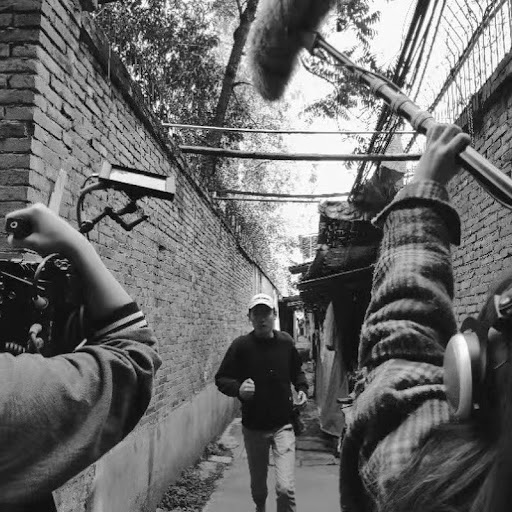
The microphone and camera are in place as Charles Zhang shoots for his award-winning short film.
Eye of the Hurricane: Student Life During the Pandemic
April 24, 2022
Covid-19 is a hurricane that took over the world, its diablerie towards mankind ripping us away from the lives we had previously known, from activities loved and done often, and from our families and loved ones. It cheated the old of what was supposed to be halcyon years of tranquility, it swindled us of cherished, priceless souls. But amidst the unprecedented chaos, those journeying through their flourishing ages of juvenile development have gained tremendously. The ending of Christmas of 2021 marks the 2-year anniversary of the arrival of Covid-19. Through four OHS students around all the corners of the world, we will explore what this period of uncertainty and pain has brought for students, how people have managed to make something out of the hardships and develop them into tangible passions and growth.
Prelude: December 2020
Without checking the small rectangular frame that popped out on top of the camera, 22-year-old Charles tapped a button next to it and fixed the focal length of 21mm lenses. In front of the camera stood Times Square. His right hand was ungloved and unprotected from the harsh December wind. Charles was one among thousands of people walking around in heavy coats and wide smiles, neon lights all around, painting nearby buildings faint magenta and indigo hues. The wind carried the smell of gingerbread as a hint of the holiday season, mixed with the metallic odor of traffic. Just an hour ago, Charles visited the Metropolitan Museum of Art. Before leaving, he indulged in a set of three golden angels, a memento that would accompany him through his journey.
“Sometimes, while I was deeply concentrating on my editing process, and really feeling the fatigue, I would look up, and it seemed like they were comforting me with their warm glow,” he reminisced, the smile evident on his face even though Zoom.
The color of Bangalore is golden orange and becomes even bronzed in winter. The soft roar of motorcycle engines, and the clink-clank of a bicycle chain is a constant beat that the city dances to. 12-year-old Kaveri closes her laptop as her class comes to an end and picks up the yoga mat lying behind her: one of the most notable benefits of taking classes at Stanford OHS was the freedom that came with it. She had started to teach yoga after a hearty recommendation from her teacher, specifically to kids, as her instructor had predicted they’d get along better.
Under an aquamarine sky with a soft layer of clouds, coconut trees stretch their necks of sunkissed bark; the Caribbean breeze swims across the beach and dances along the waves on the shores of Jamaica. The only reminder that it was Christmas were the Santa Clause drawings in the nearby mall. Tomas sat at his desk, laptop propped open, immersed in his academics. The opening and closing of the door shook him out of his head: his father was home. Immediately, Tomas jumped up from his seat and sprinted to greet his father, picking up the checkered board and tucked it under his arm — this was one of the rare moments when they were both free. Upon seeing the chessboard under his son’s arm, Tomas’ father smiled.
A soft blanket of snow delicately covered the picturesque landscape of the Duomo Cathedral in Milan, the sky was an infinite navy so dark you could almost mistake it for black. Instead of the traditional evergreen trees, there was a Christmas tree made of lights which looked like a beacon molded into a conic shape, and on the inside, it was a tunnel of a whirlwind of shining, vivid colors. This was 19-year-old Luca’s first Christmas living by himself in a foreign country. A few hours ago, he was still at the gray, angular campus of the Bocconi University, where he spent the majority of his time, either in the library or in the stuffed classrooms.
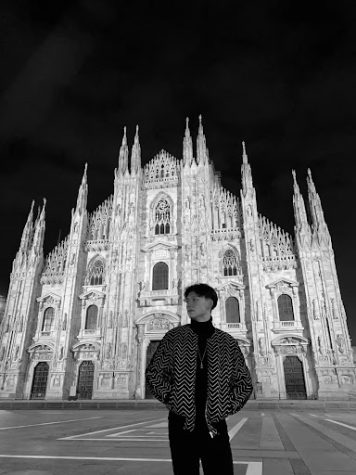
(Yang Family)
Beginning: Start of 2021
Tomas couldn’t even remember when the chaos around Covid-19 first started. First, it was panic. Everyone panicked. Headlines were loud, TV and the press just couldn’t squeeze any information out of anyone on this new viral disease, articles were published left and right, and everything came to a halt. The virus was like a big, stubborn rock that got stuck in the gears of society. Every day became the same messy routine with nothing to get done, and soon, it all became the same hazy view that he sped past. School was moved online, soccer practice was set on hold, like everything else, and there wasn’t much to entertain himself with. Everyone was on house arrest;Tomas didn’t seem to find anything to entertain himself except chess. Before everyone got pulled into the stormy effects of Covid-19, he would always play chess with his father and brother. “The pandemic was a tough and shocking time for everyone,” He said.
On a sunny April day, Tomas was back in front of his laptop. As he scrolled through lists of ‘The Best Schools’, a unique title caught his attention. ‘Stanford Online High School’, specifically the online part, was what intrigued him. It was his first experience with online school during the pandemic, and before that, Tomas could barely imagine the huge shift he’d have to make to his life if he wanted to study online. Thanks to Covid, though, online education has proven to be not nearly as intimidating as he had thought — in fact, it was a lot more liberating and effective than he had expected. That day was also the day that marked the ending of one chapter of Tomas’s life and the beginning of another.
Letters that lined up on his home screen reminded Charles that it was already April of 2020, months since his last trip to New York, and his unmade bed told him that it had been weeks since he had last been outside. In a live feed, he could see a lonely Times Square, its streets haunted by the tinges of purple that strayed from the empty halo of giant billboards. His graduation essay from Bucknell University and the occasional guilty pleasure of YouTube during class were the only activities that occupied him.
Humans communicate through languages. Charles, an international student who’d come to the United States at17, is fluent in English and Chinese, but is most comfortable in the language of film, which doesn’t know the limits and parameters of human expression like human languages do. In filmmaking, aesthetics, color-grading, and the delicate merging of separate clips make up the ingredients necessary for the pleasure of visual perception. To aid the immersive experience, sound is also added. But the paralyzed city of Lewisburg was shaken from Covid-19 and had forgotten how to speak his language, so he traveled back to his hometown, Chengdu, an alluring, verdant city in southwestern China.
Kaveri couldn’t even remember when her parents had started taking her to yoga; it had become such a routine part of her life that she would wander to the yoga classroom every day before school. The last time she had been there was weeks ago, and though it might not sound like a long time, its absence had profound impacts on her, who had once gone there every day. Instead of the peace she had once found inside the haven of yoga, she was met with panic-stricken silence from the Covid-19 outbreak. “In the span of two or three months, a lot of people were infected and nobody really knew how to deal with it. So it was sort of chaos…” Kaveri sighs as she describes the memories. She wasn’t used to the sudden pause in yoga, going from seeing the wooden walls of her oasis filled with familiar faces almost every day to not even being able to go once a week. Little did she know, the real journey was just about to begin.
For months, Kaveri was left alone to navigate through the journey and other than her friends from OHS, she wasn’t able to meet her offline friends nor see her yoga instructor, or even her students. Dwelling in her helplessness in Covid-19’s invisible prison cell, she let the months go by.
Luca and his parents had left to go back to his hometown of Shanghai, China. After the hassle of his travels and the tormenting bore of the 14 days of quarantine, Luca could barely wait to go outside, having finished with self-isolation and ready to meet his city again. Though strong traces of Covid-19 were still evident,, the scar that the pandemic had left on Shanghai was already slowly healing — as there were visibly more people in Shanghai compared to the vacant streets of Milan, which were almost chilling to see. He recalled that while he experimented with independent, adult life, Covid-19 seemed to have other plans, and within the span of a few months, he had moved to a peaceful small town surrounded by endless cornfields about an hour away from Milan to live with his parents as his classes were moved online. Everyone knew everyone, yet the inability to indulge in simple small pleasures like conversing with your neighbor depressed the town.
The rest of quarantine became a preoccupied mess: in between truly savoring the unique blend of online school, preparing to apply to Stanford OHS while also daydreaming about the good times he was going to experience there, playing chess with his father and expanding his opponent list to people from all over the world by the virtue of Internet, Tomas found many new friends.
“The strategy behind it, the complexity of the game — it’s so interesting that every game that you have is always going to be different.”
And though online competitions don’t contribute to the score of a player, Tomas still kept playing and absorbing new material; he also climbed higher and higher in national rankings. Along with the time he spent with his head propped up by his hands, staring at the chessboard, he also spent countless hours editing mini-essays for his application to OHS, typing and fixing every word.
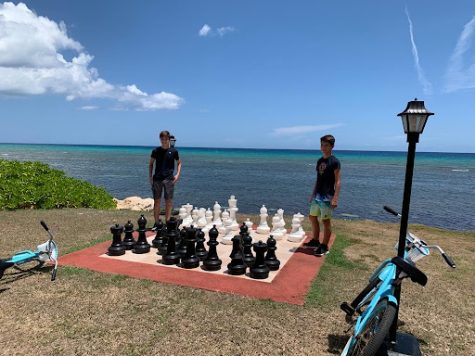
It was a June morning. There was a lengthy email from an unknown email address. “Would you be willing to teach yoga to kids with learning disabilities via Skype?” Immediately, the answer was no. Kaveri had never taught kids with learning disabilities before so she wasn’t sure how to plan the lessons, moreover, she had never taught anything online before. But as Kaveri typed up the rejection, she saw the empty calendar hanging on her wall: there wasn’t anything else planned for the next few months.
As soon as her response had been sent, she started planning the lessons. Yoga was a branch of exercise that required great mental stamina as well as physical stability. Some moves had a low chance of being executed correctly, especially the complex ones, yet the kids still required a certain degree of movement as most of them were looking for a safe way of exercise that fit them. Though she believed yoga served as an elixir for both the body and the soul, it was definitely not a one-size-fits-all type of sport, and planning the course material soon became something of a maze. “[My new students] were different. I had to change the way I teach so that they get the most benefit out of what I teach,” Kaveri says.
The days passed in a blur until the first class. nervousness crept up inside of her. Her yoga mat was laid out on the floor behind her, her laptop set up on the desk in front of her. Before long, messages started to trickle into the group chat: the kids were ready. She pushed the call button.
Ever since then, Monday evenings have become her new favorite time of the week. It was then that she got to escape to a haven of safety and comfort with her students, who, for the past few months, have exceeded the burden of ordinary students. Aside from trying their best to absorb the material and learning what she taught with attentive perseverance, they’ve also taught her significant lessons like learning and thriving despite facing severe difficulties.
But the lessons hadn’t always gone so smoothly. In the beginning, Kaveri struggled with controlling the pace and volume of her speech to ensure the children are able to understand. With the microphone across the room, it was far from easy to read the students’ expressions and adjust based on their reactions. Several times she caught herself speaking too quietly and too fast when the children stayed in position even after she had expressed that they should move. Kaveri also had to be wary of the moves that were taught to the children, as they had to be relatively easy to learn, which took her down her memory lane to when she first started yoga,
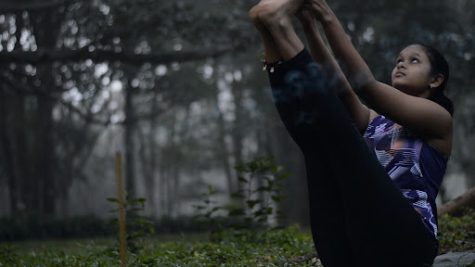
In the daytime, Luca would spend all his hours outside, savoring the freedom that had been taken away for such a long, difficult time., Soon he had also realized that students and friends from his youth, like him, had returned to Shanghai because of the spread of Covid-19 and it only took a couple of days for broken bonds to mend and detached strings to entangle themselves once more.
On a hot July afternoon, Luca sat in a crowded coffee shop. He felt significantly better – he wasn’t sure if it was because of the termination of his unhealthy lifestyle – staying up until 2:00 am, looking out onto a pitch-black sky, and hoping to climb into the embrace of his bed instead of sitting at his desk and trying his best to listen to his professor, or if it was because the people he saw were characters from a distant past. He was more than content about catching up with his schoolmates from before, but deep down, he could feel that they were all in pain from constant conflict with themselves. “We kind of just naturally drifted to that topic, I guess it was all on our minds”, says Luca, nd After many meetups, conversations, and even tears, the problem was discovered – mental health awareness in China, or even Asia as a whole, has been very sluggish and in most places it was extremely outdated. It soon dawned on Luca that this problem extenuated far beyond the world of students and into that of young adults.. What he didn’t expect was the huge surge in popularity that it experienced just weeks after the creation of his blog.
The summer heat devoured him as soon as Charles stepped off the plane. The air was warm and a sticky sweet scent reminiscent of his juvenile years clung to his figure, refusing to let go. He finally arrived there after two weeks of hell-like quarantine. He slept during the day and Covid-19 announcements and news kept him awake during the night, which is why two weeks later, he hadn’t gotten too much work done. Luckily, Charles was back at his parent’s apartment after what seemed like years of travel.
Charles began his first solo project: a short film detailing a story about a boy finding his origins, based on his own experience, amid busy diligence. A few friends from high school, a flurry of text messages, and weeks of endless frustration and planning later, a briskly put-together team was ready. The script had been examined, taken apart, remade, and put back together as if it were a ripped toy that needed fixing and Charles’ consideration was the needle and thread. “It was also hard to find actors and crew members, because, you know, I was still an undergraduate,” Charles recalls. To further drag him down, Charles also had a glass dome that limited his flight – his budget, which was mainly composed of savings from projects he did for school.
Charles also applied for a gap year at London Film School, as much as it chilled his heart colder than the air outside and stretched his patience thinner than paper, he knew that it was impossible to go right then because of the pandemic, but it was still a difficult decision that was born after endless nights tormented by sleeplessness.
Filming wasn’t half as easy as he thought. When filming, both the unpredictable weather of random showers and people, who would swarm to get a glance of the activity, were constantly interrupting their progress. Luckily, his assistant producer, who, to him, was a lifesaver in every way possible, would be able to explain and ask them to leave —, it was as if his words were bug repellent and the people were all kinds of insects. The scene at the end, however, where the protagonist lay in the hospital, was the most problematic scene to capture. It was going to be challenging to even go inside, much less film, a hospital while Covid-19 was wreaking all havoc outside, and the cycles of scheduling, canceling, and rescheduling had made them even more anxious about the wait. “We almost gave up,” he laughed. “It was just such a pain and it made our schedules such a mess as well, but I’m so glad we didn’t.”
After months of assiduity, he finally took a seat in front of his monitor. The clips were edited and merged to form something exponentially greater. Charles witnessed countless sunrises due to staying up through the night, at 5:00 AM. By 6:00, the sun was beginning to rise. And even when he was sleeping, his dreams became blurred with reality as the appearance of his editing software littered with different clips invaded the serenity of his rest and bled through into his sleepy visions. Muffled tunes of the soundtrack playing in an endless loop inside his head and the background noise of the raw materials carried along with it were like an indelible, never-ending symphony. “I became so immersed that I felt like I could never step away from my project, even when I was resting, everything just sort of reminded me of it,” he says.
Tomas’ vision came crashing down when he received an email from the admissions office in March: he had been waitlisted. He had been so busy visualizing what his life would be like with his new school that the thought of getting rejected, or even waitlisted, had slipped his mind. The email promised that he would get a definite answer by June. And so the wait began. It was a long and cruel wait; Tomas’ hopes of getting into the OHS shrunk by day. Days became longer as the thoughts of the new school itched at the back of his mind with a tinge of disappointment. “It was just kind of disappointing, we also didn’t apply to any other schools, so that kind of made it worse,” he recalls.
June 31st was the day that Tomas had given up all hope and made peace with the fact that he was not going to get accepted. He had no clue that the next morning he would be awoken by his mother’s frantic gestures at his acceptance letter.
When his blog had just begun, Luca was mostly limited to friends and friends of friends to interview to share their darkest thoughts, the thoughts they tried to suppress in front of others. He was mainly concerned about mental health, focusing on widespread problems such as depression and anxiety, and the objective was to create a safe space for people with those issues, especially in Asia where there was a significant lack of it. Luca mainly made videos, exploring the illnesses and allowing people to anonymously share their experiences with his viewers. However, he soon gathered up the courage to do interviews in the streets when he realized the content was becoming somewhat repetitive. He didn’t bear much hope for strangers to be open about issues as sensitive as depression and trust issues, yet he found that a lot of answers were incredibly insightful, and most importantly, raw and unfiltered – he could only conclude that maybe they found comfort within anonymity and the safety of being free from judgment. It was comforting to know that all the nights he had stayed up researching and scouting for every report and all the days when he had stood out under the sun with his phone and microphone had received the credit it deserved. The blog was able to show people that they weren’t alone nor weird for feeling the way they did. Content ranged from educational video presentations about serious mental issues to an open, anonymous forum where strangers could help each other.
Finale: End of 2021
On September 18th, months after the creation of his blog, Luca looked out of the oval window as the plane soared towards Milan. As the last tints of daylight faded, a new day was soon to arise. The daylight busyness of Luca’s blog was helpful and a sight worth marveling at, but as he prepared to return to everyday life, he was unsure he could provide quality content about issues worth discussing. Inside, he knew he had grown exponentially during the pandemic and he was well aware that the help he was able to offer to the people who were truly suffering every day, incarcerated in a jail of their mind every minute, was valuable beyond any measurable unit. “It was just satisfying and fulfilling to know that people appreciated the things I did— it made doing it so much more worth it,” Luca smiles.
It had been months, looking at her calendar, now filled with colored ink, Kaveri focused on the corresponding date, November 25th. Looking back at her Thanksgiving card, addressed to her friends from OHS and yoga class alike, Kaveri wished everyone a better 2022, and, miraculously, her wishes seemed to come true. As Covid-19 restrictions loosen, and the community is able to relax a bit, Kaveri still keeps teaching her weekly sessions. From basic moves to countless inside jokes to more advanced moves, a soft spot inside Kaveri’s heart was touched by the relentless hard work the children poured into her lessons. But in the afternoon, the city awakes from its slumber. The steady rhythm it once danced to was faint but if you stopped and listened, you could almost sway with it.
The ending of this chapter of Tomas’ life is a happy one. August 19th, cold fingertips gingerly tapped the keyboards of his laptop as Tomas prepared to join his first lesson at Stanford OHS. A foreign landscape was shown on the screen as he waited for the Adobe Connect room to open, it was the view of Stanford on a breezy summer’s day. Tomas peers over the laptop and out of the window, at the pastoral streets of Jamaica; one day the view in front of him will be the wide lawns stretching in front of Stanford University. But for now, he is more than excited to begin another new chapter in his life, this time with insightful professors, peers, and esteemed chess opponents from all over the globe as his co-authors.
During Christmas of 2021 — two years after what Charles considered the time of his life at Times Square — his three golden angels flew above his laptop, dangling down from the light, through their bronzed wings and across the smile on Charles’ face as he was packing for London, England. He was finally able to reap what he sowed: his film had been selected to be shown at the London Lift-Off Film Festival, the fastest-growing film festival in Europe. As the U.K. prepared for winter, though, Covid-19 cases were on the rise. But Charles was ready to face the storm, accompanied by his art.
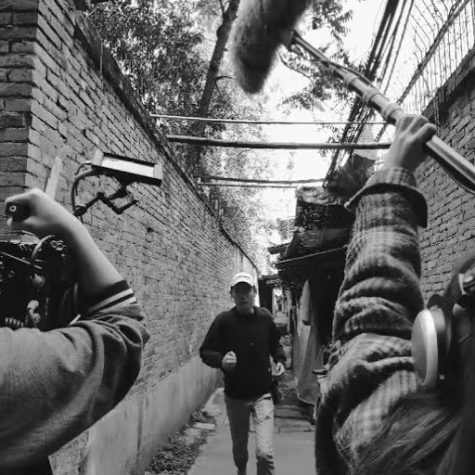
“I’m excited to see where this leads, I love doing what I do, so everything seems a lot more bearable.”
His passion had been like a torch in the dark, windy mayhem of the world. He’d ventured out of the comfort of his familiar cage to a wide, whimsical world, where the hurricane of Covid-19 continues to rage on. Yet without fear, he continues, diving headfirst into the unearthly winds with a camera in his hand, ready to capture the world.

alan • May 3, 2022 at 4:49 pm
Writing ability is a rare gift,u have the talent…